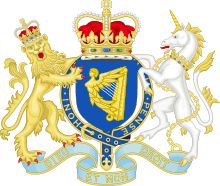Banishment Act
The Banishment Act or Bishops' Banishment Act (9 Will 3 c.1) was a 1697 Act of the Parliament of Ireland which banished all ordinaries and regular clergy of the Roman Catholic Church from Ireland. By 1 May 1698 all "popish archbishops, bishops, vicars general, deans, jesuits, monks, friars, and other regular popish clergy" had to be in one of several named ports awaiting a ship out of the country. Remaining or entering the country after this date would be punished as a first offence with 12 months' imprisonment followed by expulsion. A second offence constituted high treason.
 | |
| Long title | An Act for banishing all Papists exercising any Ecclesiastical Jurisdiction, and all Regulars of the Popish Clergy out of this Kingdom |
|---|---|
| Citation | 9 Will 3 c.1 |
| Introduced by | Murrough Boyle, 1st Viscount Blesington |
| Dates | |
| Royal assent | 25 September 1697 |
| Repealed | 13 August 1878 |
| Other legislation | |
| Repealed by | Statute Law Revision (Ireland) Act 1878 |
Status: Repealed | |
| Text of statute as originally enacted | |
The act was one of the Penal Laws passed after the Williamite War to safeguard the Church of Ireland as the established church and from fears of Catholic clerical support for Jacobitism. It was foreshadowed by proclamations issued by the Dublin Castle administration in 1673 and 1678 with similar terms.[1] The banishment was originally and most effectively applied to regular clergy; many of whom registered (under the Registration Act 1704) as parish priests to be treated as secular clergy and avoid deportation. The ban on bishops may have been intended to prevent ordination of new priests, which, coupled with a ban on clerical immigration would lead to their eventual extinction.[2] Of the eight Catholic bishops in Ireland when the act was passed, two left, one (John Sleyne) was arrested, and five went into hiding. The port authorities paid for the passage of 424 clerics who emigrated; Mary of Modena estimated that about 700 in total left, of whom 400 settled in France. Priest hunters were active in subsequent decades. Maurice Donnellan, Bishop of Clonfert, was arrested in 1703 but rescued by an armed crowd.
Amendment and repeal
The act was gradually less stringently enforced as the eighteenth century progressed.[3] The Roman Catholic Relief Act 1782 provided that its provisions could not apply to a priest who had registered and taken the oath of supremacy. The act was explicitly repealed by the Statute Law Revision (Ireland) Act 1878.[4]
See also
- Catholic Emancipation
- Irish Church Act 1869
- Roman Catholicism in Ireland
References
Sources
- Primary
- "Bill 2059: For suppressing all friaries, monasteries, nunneries and other Popish convents, and for banishing all regulars of the Popish clergy out of this kingdom". Irish Legislation Database. Queens University Belfast. Retrieved 17 February 2020.
- "9th of William III chap 1". Statutes Passed in the Parliaments Held in Ireland. II: 1665–1712. Dublin: George Grierson. 1794. pp. 287–291. Retrieved 17 February 2020.
- Burke, William P. (1914). The Irish priests in the penal times (1660–1760) : from the State Papers in H.M. Record Office, Dublin and London, the Bodleian Library, and the British Museum. Waterford: Printed by N. Harvey & Co. for the author. Retrieved 19 February 2020.
- Secondary
- Connolly, S. J. (2008). Divided Kingdom: Ireland 1630-1800. Oxford: OUP. ISBN 978-0-19-156243-3. Retrieved 20 February 2020.
- Simms, J. G. (September 1970). "The Bishops' Banishment Act of 1697 (9 Will. III, c. 1)". Irish Historical Studies. 17 (66): 185–199. ISSN 0021-1214. JSTOR 30005134.; reprinted in Simms, J. G. (1986). War and Politics in Ireland, 1649–1730. A&C Black. pp. 235–250. ISBN 978-0-8264-3609-2. Retrieved 19 February 2020.
Citations
- Connolly 2008 p.199
- Connolly 2008 p.203
- Connolly 2008 p.262
- "Statute Law Revision (Ireland) Act 1878, Schedule". electronic Irish Statute Book (eISB). Retrieved 19 February 2020.